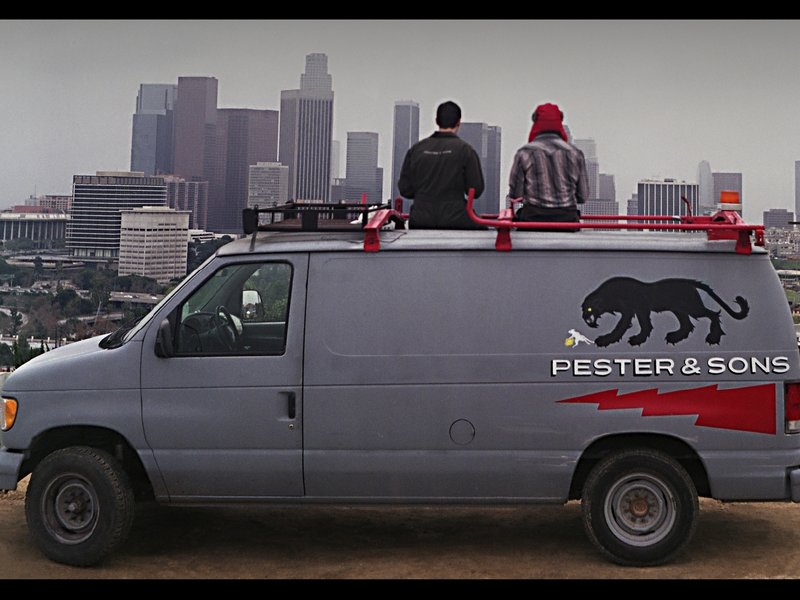Almost all of the animals in the animal kingdom have the people’s care, appreciation and respect … except bugs. Nobody wants bugs around. They are annoyances, they are pests and we have no problem brutally murdering them for trespassing on our territory. We have vegetarians and vegans, but very few coming to defend the rights and dignity of little multi-legged critters.
Consider writer-director Eric Gerber – a UWM grad currently living out in Los Angeles – one of those very few.
His latest film, "Pester," asks some intriguing questions about the epic ageless battle between man and bugs, as well as the ethics of extermination – all while following around two exterminator brothers trying to work out their lives and business. Even though he was surrounded by desperate actors and actresses out on the west coast, Gerber decided to call back to Milwaukee and bring in some local Midwest talent to bring his treatise on pest extermination to the screen.
After several years, the results are finally hitting the big screen at the Milwaukee Film Festival. The movie officially premiered Sunday night at The Times Cinema, but there’s still another showing at the Oriental on Sunday, Oct. 5 at 10 p.m. Before that final show, OnMilwaukee.com chatted with Gerber to find out about making a Milwaukee movie in L.A. and why he cares about critters.
OnMilwaukee.com: How did you come up with the idea for "Pester"?
Eric Gerber: I remember years ago watching a commercial on television; it was a Raid commercial or some kind of pest control commercial. This family was sitting around with an exterminator in the background, spraying up the whole room with chemicals. Everyone was just so happy, and they’re talking about killing a colony of cockroaches. "40 thousand of them can be gone in a matter of seconds!" There was this montage of happy children, and everyone was so happy. Something just seemed so strange to me about this commercial advertising killing, but it’s got a big smile on its face.
I just felt what if there was a character who really loved his job as an exterminator but didn’t use conventional methods and had more intimate ways of disposing of insects. If you’re killing pests with chemicals, sprays or poisons, you’re doing it from a distance. You’re not up there in person. Our main character in this film, he’s somebody who’s not afraid to embrace his work in a more close quarters fashion.
He’s also met with the opposition of his brother, who is a part of the family business but reluctantly so. He sees the ethical problems with killing and challenges his older brother. It’s really a film that’s more of a character study than anything else. It’s this struggle between these two brothers who have their own demons and issues they’re trying to overcome, but they’re doing it in the backdrop of a city that’s kind of falling apart.
OMC: It sounds like you have sympathy for these bugs getting exterminated.
EG: Absolutely! That’s the topic because here’s a film that deals with the topic of exterminating pests, and it’s something that’s concerning to me. I wanted to somehow give some kind of voice to these little critters that we can dismiss and consider disgusting.
OMC: Were you always interested in bugs and insects and critters, or was this just from that one commercial you saw?
EG: No, I’ve always had an interest in bugs. It’s not that I have a particular love for them or anything; I’m not a fan of having cockroaches in my home by any means. But I do think that a lot of movies that I’ve been interested in watching or making that have themes that culminated in this feature.
I don’t want to scare people away with the topic of extermination; it’s something I want to raise a lot of ethical questions. A lot of the struggles that exist within us are explored in this film.
OMC: What kind of movies did you have in mind while you were writing, directing and piecing together "Pester"?
EG: I can’t really point to a particular movie or movies that I was trying to emulate. This is a movie that comes from a lot of the worries that I’ve had my whole life. Writing the film took me three years, finding different voices to try to explore.
I can say that there are filmmakers, like Paul Thomas Anderson, who are enormous influences in just their stylistic elements and in their encouragement of having their actors improvise.
Two of the main actors are Milwaukee graduates – Nick Sommer and Mathew Dunlop – and it was such a unique experience having those two play brothers. While filming, they lived together for the month of time we were shooting. I really wanted them to improvise off of each other, and I wanted to give them room to go home at night and discuss who they were as characters. I never wanted the actors to recite specific lines. I think one of the main directions I had was don’t memorize your lines. Don’t come in here and read exactly what’s here; use this as a vessel that you can interpret how you wish, vocalize or act it out in a way that’s natural to you.
OMC: While you’re watching a scene play out, how do you figure out what’s good improv, and when do you realize when you have to step in and stop it?
EG: Before going into a scene, we’d have so much time practicing what the kind of themes or points were that we were trying to hit home without being too on the nose. I wanted us to find a way to talk about the scenes beforehand and then cast an open net to say, "Go for it." You let them hash it out and then sort of say, "I like what you’re doing here, but maybe let’s back off on this tone here."
It’s never that the actors had total free range; it was just that I wanted them to feel invited and welcome to add their own vocabulary to the film so it was more natural and they didn’t sound like written lines. That was a big fear that I had. Often times, I think you cringe at the rough or rigid acting because directors are so strict and stringent to wanting to stay exactly how the lines are written. I didn’t want any of that; I wanted them to feel free and to add their own voice to it.
OMC: You live out in L.A. right now, but obviously you went to UWM and graduated from there. What was the thought of making this a Milwaukee production?
EG: Well, a lot of it was just that I missed Milwaukee a lot. Being out here in Los Angeles, sure, everybody thinks this is a cool place where movies are made. But I’ve never been someone who’s aspired to be a Hollywood filmmaker. I don’t feel like I’m someone who has a Hollywood mindset at all, and when I was in Milwaukee, I loved how the film department was such an anti-Hollywood kind of place that encouraged the kind of films that you don’t see anywhere else.
The people out here are very formulaic and have a very narrow-minded approach to filmmaking. Being a student of the film program at UWM, I feel that’s one of the unique things that I can add as a filmmaker living out here.
You watch the film, and you feel like it was made in Milwaukee. I didn’t want to show Hollywood as though it was a place where you see it with sunshine and palm trees and everyone’s on a beach. I don’t like that side; I’m more interested in the gritty, dirtier parts that are forgotten and run down. I wanted this film to feel like it could be anywhere; it just happens to be shot in Los Angeles.
OMC: How was the filming process out there?
EG: All of our locations were done without having any permits. It was very much a run-and-gun type of film. The crew was incredibly small. It was myself shooting with the camera; Drew Rosas, who’s a producer and editor, running the sound; and then just the two actors, with occasionally with one or two other people helping out. We always wanted to have a small footprint so we could move to an opportunity and film things without drawing a lot of attention.
Out here, if people see you filming a movie, they want a piece of it, whereas back in Milwaukee, people want to support your film and help you out.
I knew there would be actors available out in Los Angeles – there’s tons of actors everywhere – but I think there’s something really special about the talent that exists within Milwaukee. It’s very unusual to be living in Los Angeles, surrounded by actors all trying to get a part, and then importing a cast from a place like Milwaukee. It’s something most people wouldn’t do, but I think it’s one of the best decisions I made for this film.
OMC: Do you think you’ll ever film another movie in Milwaukee, or are you’re going to stick it out in L.A.?
EG: I work as a freelance camera operator, and what’s nice about doing that is that I can work for a while, develop a lot of technical skills working with most modern cameras and toys and apply that knowledge to my own films. It’s easier to that out here, but Milwaukee is the place I consider home. The five years I lived there and went to school there, it’s something I think about often and really shaped me as a filmmaker. So I really want to stay connected to Milwaukee, and I certainly hope and expect to shoot films in Milwaukee in the near future.
There will always be a Milwaukee connection with everything that I do because it’s a voice that I want to always try to promote. It’s something that, when I’m out here, I’m always telling people Milwaukee is a hidden treasure. It’s this wonderful place that’s filled with creativity and so supportive of local filmmakers. I’m just honored to be a part of that.
As much as it is a gigantic cliché to say that one has always had a passion for film, Matt Mueller has always had a passion for film. Whether it was bringing in the latest movie reviews for his first grade show-and-tell or writing film reviews for the St. Norbert College Times as a high school student, Matt is way too obsessed with movies for his own good.
When he's not writing about the latest blockbuster or talking much too glowingly about "Piranha 3D," Matt can probably be found watching literally any sport (minus cricket) or working at - get this - a local movie theater. Or watching a movie. Yeah, he's probably watching a movie.







